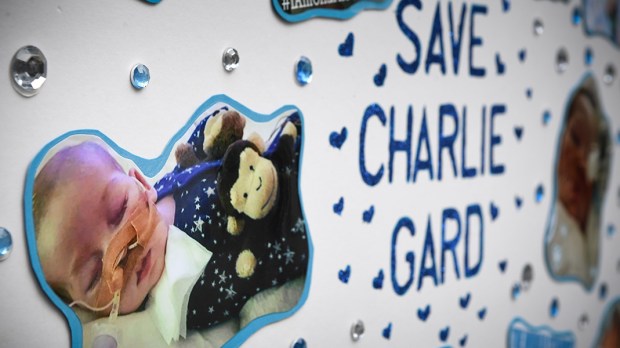Not many one-year-olds have made an impact on world events, but Charlie Gard will leave a legacy of getting people to think about a heart-wrenching situation that relatively few parents have to think about.
Charlie died Friday, just a week before his first birthday and mere months after he began making headlines that drew the attention of Pope Francis, President Trump and millions of sympathizers.
The toddler’s mother, Connie Yates, said in a court statement earlier this week that her son had “had a greater impact on, and touched more people in this world in his 11 months than many people do in a lifetime.”
Friday, she announced, “Our beautiful little boy has gone, we are so proud of you Charlie.”
Charlie had a rare and debilitating genetic condition known as mitochondrial DNA depletion syndrome, leaving him blind and deaf and unable to swallow and breathe on his own. He was the subject of numerous court hearings, the last of which deemed that he die in hospice, rather than at home. Doctors treating Charlie called the “risk of an unplanned and chaotic end to Charlie’s life” at home was “unthinkable.”
Most of the court battles had been over whether to grant the parents gain permission to take their son to the United States for an experimental treatment, for which they had raised about $1.7 million.
In March, doctors decided that there was nothing more they could do for Charlie, and they recommended that his parents withdraw his ventilator. They refused, and the Great Ormond Street Hospital in central London, where Charlie was being treated, applied to the courts to forestall further treatment.
Dr. Michio Hirano, a neurologist at Columbia University Medical Center in New York, gave Charlie’s parents some hope that a treatment known as nucleoside therapy might improve Charlie’s condition. But when Hirano traveled to London this month to examine Charlie, a series of scans showed that the boy had suffered muscular atrophy, that the damage was irreversible and that treatment would be futile.
The hospital argued that the child had irreversible brain damage, but Yates maintained that the experimental treatment might have worked if she and her husband, Chris Gard, had been able to intervene sooner. Nevertheless, on Monday the parents dropped their legal battle.
In the end, Yates and Gard felt that even their choice of how to say goodbye to Charlie was being denied them. “We just want some peace with our son, no hospital, no lawyers, no courts, no media—just quality time with Charlie away from everything to say goodbye to him in the most loving way,” Yates said Thursday. “Most people won’t ever have to go through what we have been through, we’ve had no control over our son’s life and no control over our son’s death. I’m shocked that after all we’ve been through, they won’t allow us this extra time.”

